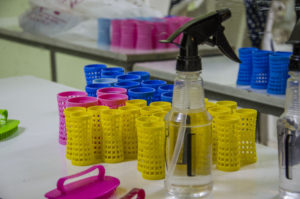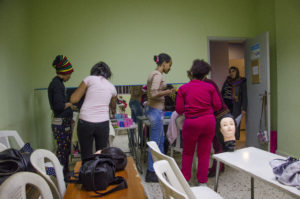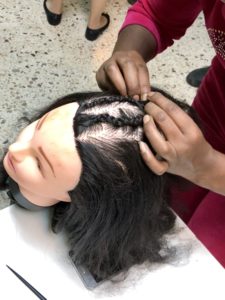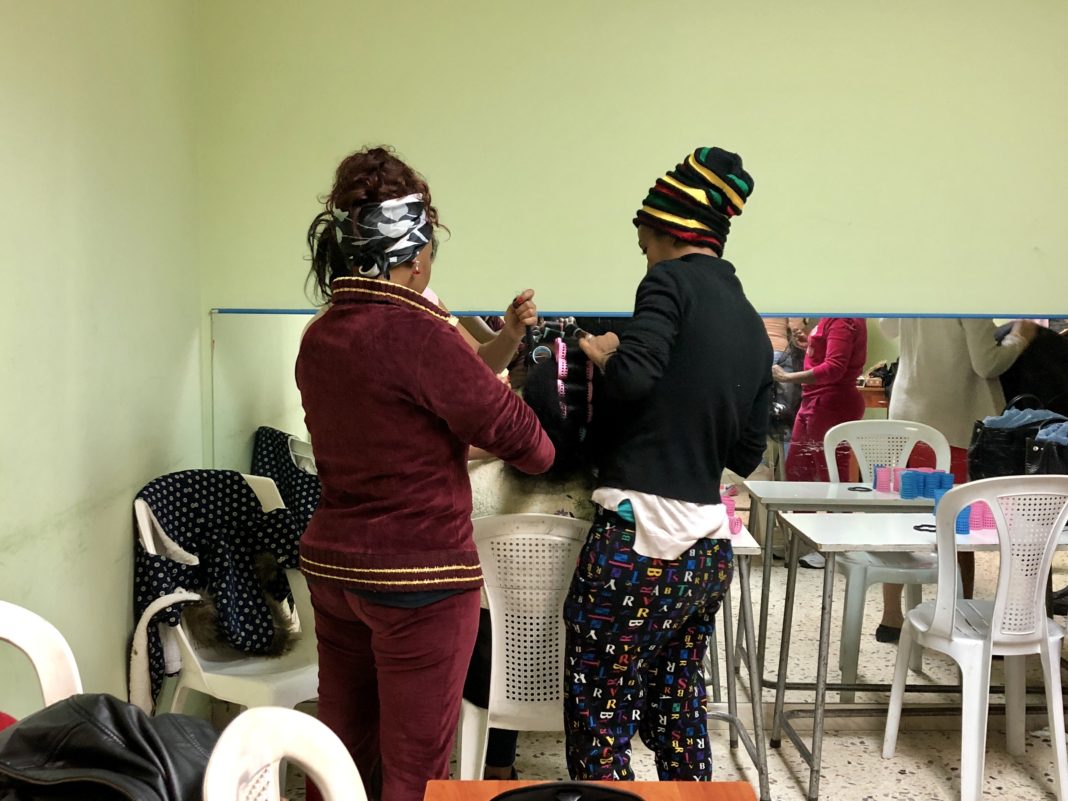Orange the world. Amel Association International endorses the UN’s #HearMeToo campaign
The International Day for the Elimination of Violence Against Women marked the first day of worldwide activism, prompted by the UN, to raise awareness of and tackle all forms of physical and psychological aggression against women and girls. The campaign, under the motto ‘Orange the World’ will last until Human Rights Day on the 10th of December. Until then activists are encouraged to wear orange in solidarity.
On this occasion, Amel speaks to migrant domestic workers from Ethiopia. They come to Amel’s Bachar Mohanna and Muslim Akil Centre in Chiyah, Beirut, on both Saturdays and Sundays to undertake training in various professional ventures and economic empowerment activities. On Saturdays they have hairdressing class. Since migrant domestic workers are, in theory, entitled to a full day off, on Sundays the centre plans more activities, including make-up, fashion, language and computer courses.

Amel closely follows cases of violence and abuse against migrant victims here in Lebanon, and in collaboration with partners in countries of origin (COOs). Most of these women left their homes in Ethiopia, the Philippines, Bangladesh, Sri Lanka, Nepal and Indonesia, among other countries, to come and work as live-in domestic workers. The International Labour Organization (ILO) estimates that there are 250,000 migrant domestic workers (MDWs) working in private households in Lebanon.
Subira* (24) has been in Lebanon for seven years, in the same house. She has not been back to Ethiopia in five years. She has a particularly good situation – she gets Saturday afternoon and all of Sunday off, has keys to her employer’s house and has her passport at hand. It has been noted that employers seize workers’ identification documents for fear of them ‘running away’.
It takes Subira*, who is now a hairdresser trainer herself, one hour to get to Amel’s centre in Chiyah. She says it is well worth it. “The centre has helped me with my sewing skills. I can now make some good skirts, and want to learn to make trousers soon.” When asked about her experience here so far, she says “Lebanon is a school in life.” She adds: “I have learnt how to live with people from a different culture and background. My Madame is so nice to me, but less than 20% of employers are good to their employees.”

Migrant domestic workers operate under an internationally-condemned kafala sponsorship system that grants heightened power to employers and often leads to exploitative and abusive working conditions. Human rights violations against MDWs range from physical, sexual, economic or emotional abuses, to restrictive freedom of movement, and limited or non-existent communication with their families.
There have been numerous cases reported of employers not respecting MDWs right to one full day off, exploiting their live-in domestic workers to work around the clock in what can only be described as modern-day slavery. This is especially the case if they get paid less than they were promised, a deception commonly attributed to the middle-man working throughout the recruitment process in countries of origin, as well as in Lebanon.
Part of the problem is that MDWs are not protected under Lebanon’s labour law, which does not recognise the ILO’s 189 Convention that stipulates the conditions and rights that migrant domestic workers are entitled to. Their recruitment, work and living conditions are instead informally regulated by the kafala sponsorship system, grounded in customary practice and administrative procedures where the rights and responsibilities of a migrant domestic worker can be widely interpreted and disputed.
Crucially, the kafala system binds a worker to her employer, who must pay a lump sum of anywhere between $1000 and $3000 to private recruitment agencies to secure a live-in domestic worker. Most current and would-be employers are unaware that Lebanese law permits the hiring of migrant domestic workers without going through an agency. While many COOs have banned their citizens from traveling to places like Lebanon and other countries in the Middle East for work, migrants still manage to arrive through illegal means, often involving human traffickers and smugglers.

Amel’s centre in Chiyah is a safe space for victims of exploitation, human trafficking and abuse, where women can bond with others who have similar experiences, feel empowered and learn new skills. The Ethiopian ladies that attended the Saturday hairdressing session are either workers who have particularly good working conditions, for their employers allow them to take the day off and convene with friends and Amel’s social workers, or they are irregular migrants who are working on a ‘freelance basis’, cleaning several homes and living in their own shared accommodation. These women have often left their employers, commonly leaving behind identity documents and personal possessions.
Faizah* (26) is one such example. She has been here since she was 19 years old and used to live with a family that would physically abuse her. After running away from her employers she eventually got her papers in order and now works as a cleaning lady. She enjoys her freedom and is happy living with friends in a shared rental. “I think I will go back to Ethiopia in around six months” she says. “I have a baby back home that lives with my brother.”
Amel’s work with migrant domestic workers across Lebanon promotes advocacy, coordination and service-provision to improve the working and living conditions, as well as the dignity, of hundreds of women whose fundamental human rights are being violated. Furthermore, Amel’s Programme to Support Migrant Domestic Workers and Counter-Trafficking raises awareness for all parties involved in the recruitment and employment of MDWs. Amel also conducts valuable research in Lebanon and in COOs, and advocates for better rights for both employers and employees within a sponsorship system that poses challenges for both. Arming women with tools and skills for their own empowerment lies at the core of Amel’s mission in this space.
*Names have been changed for anonymity purposes.
By Alexia Faus





 Creative Commons Attribution 4.0 International license
Creative Commons Attribution 4.0 International license